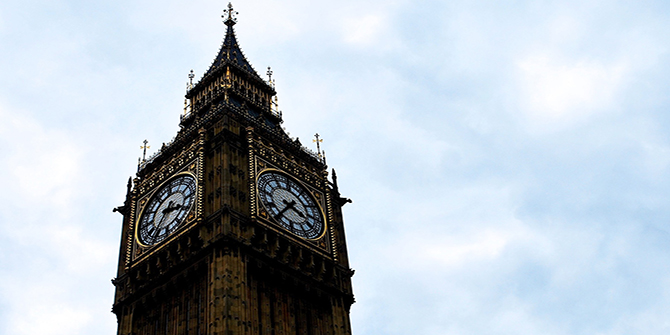 The Prime Minister’s proposal to teach ‘British values’ in primary and secondary schools was criticised for being exclusionary. Clara Sandelind suggests that it is indeed possible, and even desirable, to incorporate universal liberal values as part of a British identity. She points out that national pride in Britain is increasingly attached to pride in the way democracy works, and that such national pride can form the basis of an inclusive patriotism. However, while situating universal values in a shared identity may make it easier to mobilise citizens around them, critics are right that it may also turn them into a means of exclusion.
The Prime Minister’s proposal to teach ‘British values’ in primary and secondary schools was criticised for being exclusionary. Clara Sandelind suggests that it is indeed possible, and even desirable, to incorporate universal liberal values as part of a British identity. She points out that national pride in Britain is increasingly attached to pride in the way democracy works, and that such national pride can form the basis of an inclusive patriotism. However, while situating universal values in a shared identity may make it easier to mobilise citizens around them, critics are right that it may also turn them into a means of exclusion.
Following the so-called ‘Trojan Horse’ allegations, Michael Gove and David Cameron have put British values, or what Cameron has called “muscular liberalism”, back at the centre of the discussion on social cohesion. As in Cameron’s 2011 Munich speech, British values are framed mainly in opposition to what it is not. The goal is to advance social cohesion under the umbrella of British values, but by contrasting this to the practices of Muslim communities it may have the opposite effect. Contrary to what critics have claimed, though, this does not mean that all attempts to build a shared identity around British values are by definition exclusionary. Promoting liberalism as British can strengthen the commitment to these values by embedding them in a deeper sense of identity. However, if liberalism is preferred because it is British, then support for liberalism is based much more in an exclusionary form of nationalism than in a commitment to the values of democracy, freedom and tolerance.
Some commentators have been quick to point out that these values are not unique to Britain and that promoting them is in itself exclusionary. It is true that favouring one set of values is exclusionary towards those who do not share those values. Cameron has made it clear that he will not tolerate the intolerant. On this matter most critics probably agree. They would not tolerate the illiberal when it comes to practices such as forced marriage or female genital mutilation. But a shared identity based on British values need not be exclusionary towards specific communities only because it does not tolerate the illiberal, though this is how the debate is being framed.
It is possible to incorporate universal liberal values as part of a British identity without, for example, creating more hostility towards immigration. Studies show that when people are proud of their country’s democratic and social institution and attach such pride to their national identity, they tend to be less negative towards immigration (see also here and here). There is therefore nothing inherently exclusionary about uniting around a civic patriotic identity that celebrates democratic institutions and liberal values, even if there is nothing particularly British at all about those values.
The latest British Social Attitudes survey does show a slight decline in those who have a purely civic national identity, though generational differences are large, with 40 per cent of those born after 1964 having a civic national identity compared to 13 per cent amongst those born pre-1945. Moreover, even though we have been fed a general picture of increasing distrust in the political system, national pride in Britain is increasingly attached to pride in the way democracy works. Such national pride can consequently form the basis of an inclusive patriotism.
Jürgen Habermas’s “constitutional patriotism” is based on the idea that citizens unite around the universal values of the constitution, yet it also includes the notion that a commitment to universal values must be embedded in a particular political culture. This political culture is in turn rooted in the history of the democratic institution of each democratic country – not far off Cameron’s insistence that we instill democratic values through the teaching of historical events and symbols such as the Magna Carta. Cameron’s cries are therefore not necessarily expressions of exclusionary nationalism, but a kind of rooted patriotism.
However, while situating universal values in a shared identity may make it easier to mobilise citizens around them, critics are right that it may also turn them into a means of exclusion. Is the commitment to Britishness prior to and stronger than the commitment to liberalism? If that is the case, it creates a fragile ground for liberalism as well as for community cohesion.
In my comparative interview study of Swedish and British national identity and attitudes to immigration, one British respondent, answering a question on what democracy means in personal terms, highlights this fragility:
Even now in this country, some religions, still the woman walks ten steps behind the man. I don’t agree with that. If they’ve come to Britain, do what the British do. I respect what goes on where I go and I don’t agree with them trying to come here now, and still live in little ghettos and not integrate.
The response implies that gender equality is an important value because it is a British value, not because it is universally valid. This is a far less stable ground to build commitment to liberal values on. Liberalism is conditioned on whether or not it is the authentic expression of a nationalist identity. By contrasting British values to Islam, as in recent inferences made by Gove and Cameron, it is precisely this latter, much weaker, commitment to liberalism that is being promoted.
What is more, it makes the judgment of other practices dependent on whether or not they are British, not whether or not they are liberal. The risk with framing the debate about British values in opposition to Islam is that it is the non-Britishness of Islam that is critiqued, not some of its illiberal practices. That is not a stable basis for community cohesion, nor is it a stable basis for a ‘muscular’ liberalism, as Muslims as such become the target of suspicion, rather than those specific groups that oppose liberal values.
Note: This article gives the views of the author, and not the position of the British Politics and Policy blog, nor of the London School of Economics. Please read our comments policy before posting. Image credit: Ben Fisher/GAVI Alliance
 Clara Sandelind – University of Sheffield
Clara Sandelind – University of Sheffield
Clara Sandelind is a PhD student at the Department of Politics, University of Sheffield. Her research is on nationalism and attitudes to immigration and she is currently editing a book on anti-immigration populism that will be published in November by the European Liberal Forum. She tweets from @clarasandelind.








Given low and falling rates of participation in democracy it is difficult to see pride in democratic institutions as a cornerstone of British values.